
There’s so much about mushrooms to love and treasure. Not only are they umami or flavor bombs by nature, but they’re also packed with amazing health benefits.
Did you know that mushrooms’ perceived magic goes back hundreds of years? Civilizations have treasured mushrooms as a source of healing and strength. The Romans called them “Food of the Gods,” while the ancient Greek warriors consumed mushrooms to provide them strength for battles. For the Chinese, they considered mushrooms an “elixir of life” and have long been part of the Chinese medicinal culture.
Today, mushrooms have secured its spot on our plates and in our tummies. They’re now popular as a “powerhouse nutrition” food. In Japan, they’re developing a mushroom based-drug to treat cancer.
What makes mushrooms incredibly popular, and a favorite among health buffs? Read on as we dive into the magic of mushrooms.
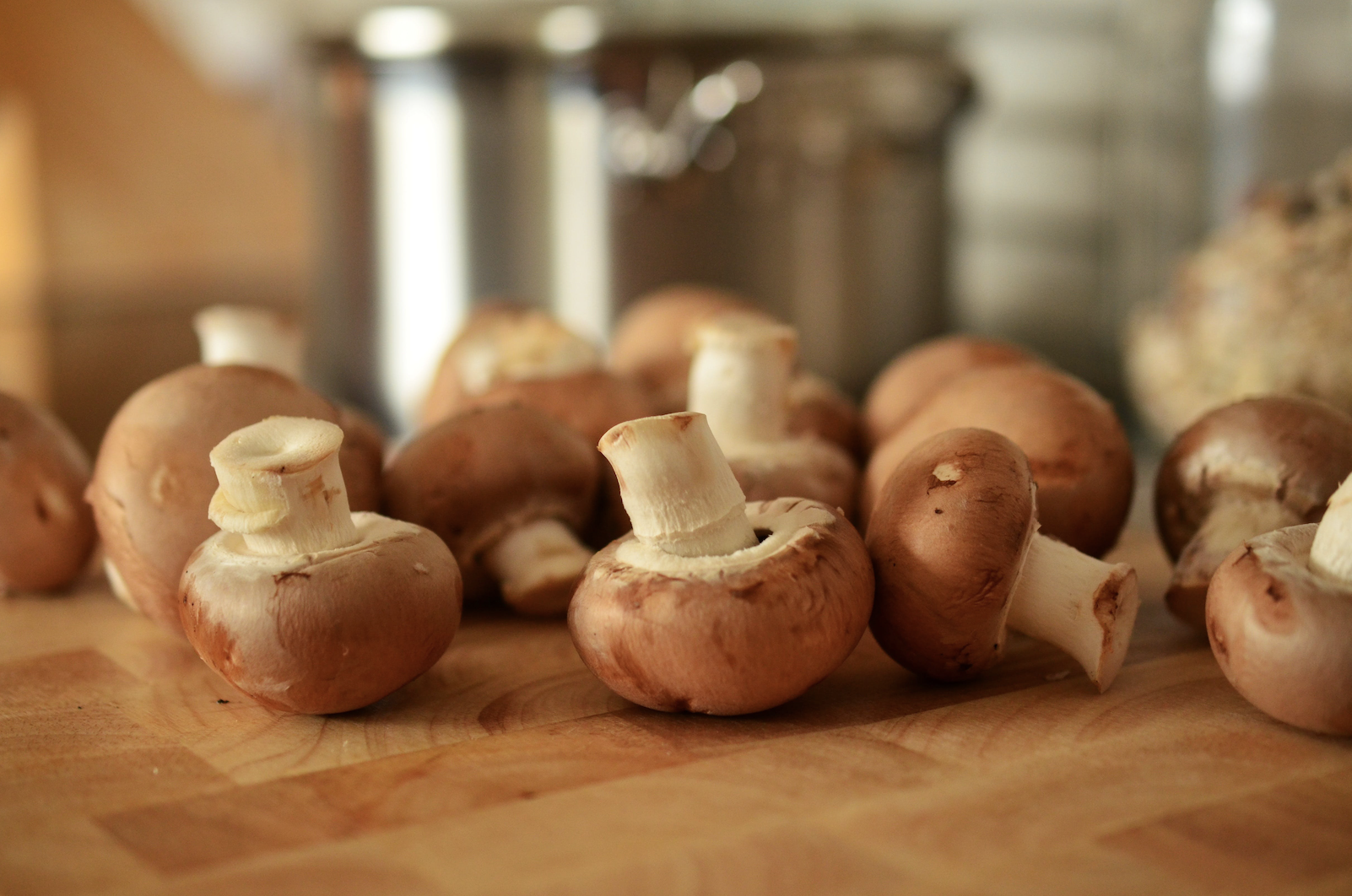
What’s in a mushroom?
To understand a mushroom in full, one needs to know what it is first. What is a mushroom?
Mushrooms are neither plants nor animals. Although considered a vegetable, mushrooms are a fungus, which puts them in a separate kingdom, according to the Mushroom Council.
Mushrooms grow in the wild outdoors, but those varieties are not typically for eating (some might even be deadly.) Instead, mushrooms are grown and harvested indoors all year round. (Fun fact: they don’t need light to flourish, they only need compost.)
Mushrooms are packed with a ton of essential vitamins and minerals, along with protein and fiber, antioxidants. They may also help lessen the risk of Alzheimer’s disease, heart disease, cancer and diabetes.
Here’s a list of mushroom’s nutrition facts, published by Cleveland Clinic.
Selenium: Helps your body make antioxidants to prevent cell damage.
Vitamin B6: Supports your nervous system and helps form red blood cells.
Riboflavin, niacin, and pantothenic acid: Helps carry out several metabolic reactions and are involved in the production of energy.
Potassium: Identified in the 20202 Dietary Guidelines for Americans as an under-consumed nutrient, potassium is essential in your body – it helps muscles contract, assists with fluid balance, and maintains normal blood pressure.
Zinc: Supports your immune system and healthy growth in babies and children.
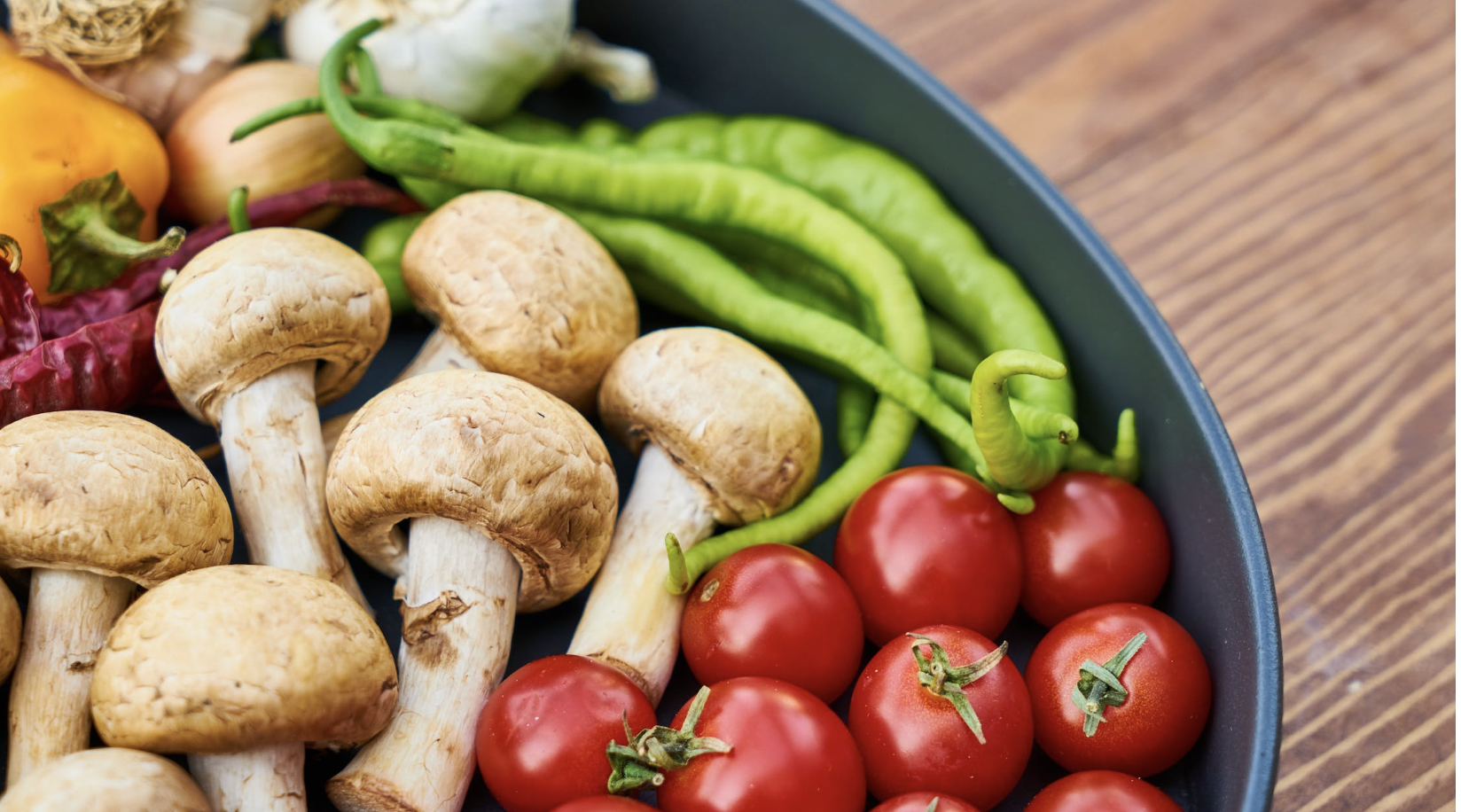
What are the health benefits of eating mushrooms?
Offers Immune Support
Number one on our list is the immune health benefits of mushrooms.
Mushrooms are touted for their anti-inflammatory properties – high amounts of selenium, which can prevent cell damage in our bodies. Vitamin D helps with cell growth, Vitamin B6 helps our bodies form red blood cells. All of these nutrients work together to help support a healthy immune system.
Some research also found a potential link between higher mushroom consumption and lower cancer risk. (check this link for the study).
Blood Pressure Management
Mushrooms are rich in potassium, a nutrient known for helping the body manage blood pressure. Potassium reduces the negative impact sodium can have on your body. It can also lessen blood vessel tension.
Supplies Vitamin D
Mushrooms are one of the few plant foods that contain ergosterol, a precursor to vitamin D2. This means ergosterol turns into vitamin D when exposed to ultraviolet light. So exposing the mushrooms to light, even for just 15 minutes, helps you consume your vitamin needs for the day.
Support Weight Loss
How? For one, mushrooms are extremely low in calories. For two, mushrooms are considered nutrient-dense vegetables, helping you feel full for longer. Additionally, mushrooms help improve metabolic rates, allowing your body to burn fat effectively. Of course, weight loss goes hand-in-hand with a healthy diet, exercise, and other lifestyle changes.
Improve heart and brain health
A few studies suggest that mushrooms, which are rich in polyphenols and other antioxidants, may help protect against neurodegenerative diseases like Alzheimer’s and Parkinson’s.
Also, it turns out mushrooms are heart–healthy too. According to Cleveland Clinic, “their nutrients and plant-based compounds can help prevent plaque buildup in the blood vessels.”
Instead of meat, Cleveland Clinic, through their resource interviewee, advises eating mushrooms instead. Besides, mushrooms have a meaty taste, and are much more nutritious.
Improves gut health
As fungi, mushrooms are chock-full good bacteria, that are good for your gut. In addition to this, medicinal mushrooms are packed with prebiotics. They’ve been shown to reduce inflammation, strengthen the lining of the gut, and improve gut bacteria diversity (aka promote a community where good bacteria can grow and thrive).
What are the types of mushrooms?
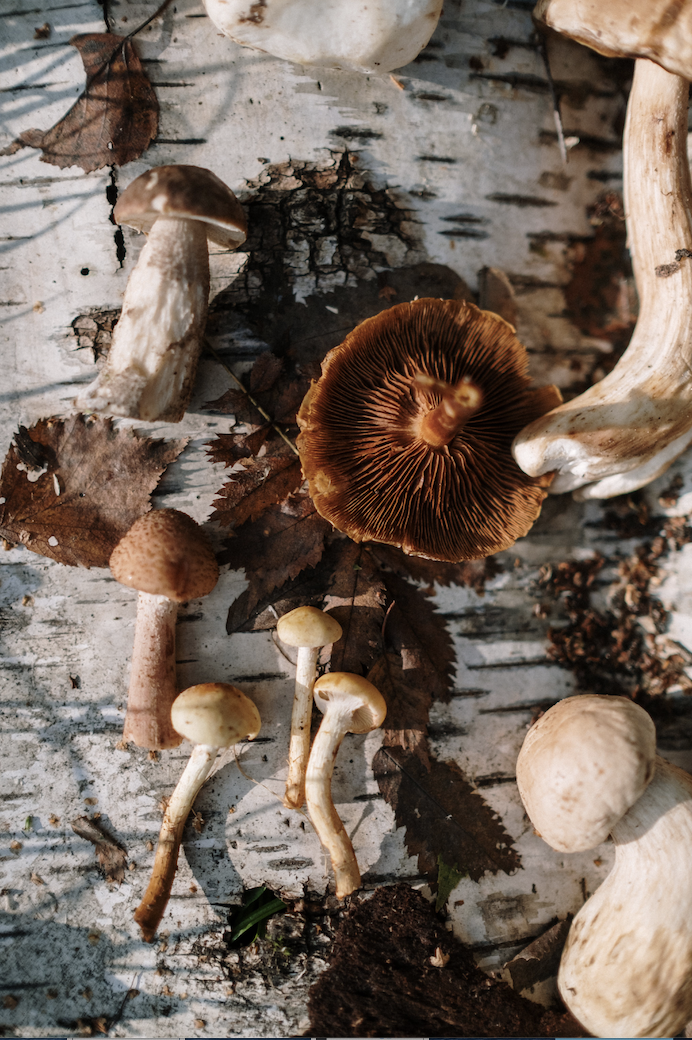
White Button Mushrooms
You’ll definitely recognize this from the grocery stores. This is a great and safe all-purpose pick, buttom mushrooms are creamy white on the outside, and has down brown lines inside. This mushroom type is not as tasty as other mushrooms, but they still work well in most recipes.
Cremini Mushrooms
Also known as baby bella mushrooms, cremini mushrooms are firm, dark, and typically have brown taps, white stems, and a tan interior. Though they taste similar to button mushrooms, they typically cost a little extra. Cremini mushrooms make great soups, gravy, pasta sauce, risotto, pizza toppings, and more.
Shiitake Mushrooms
Shiitake is one of the most popular types of mushrooms. It has a distinct look with light to chocolate brown color exterior, white or cream interior, and a distinct taste described as rich, earthy, and meaty. Shiitake mushrooms often have large caps measuring 2 to 5 inches wide. When cooking this type of mushroom, it’s best to chop off the stems as they are very fibrous and tough to eat.
Oyster Mushrooms
Oyster mushrooms are a type of gilled mushroom and is one of the most common mushrooms in the world. Known for its meaty texture, oyster mushrooms make great meat substitutes for stir-fries, tacos, and more.
Chanterelles
Chanterelles are orange, flower-like mushrooms known for their slightly fruity flavors, and their lovely fragrance and appearance. Fry them in oil or butter before adding as garnish to meat.
Enoki Mushrooms
Enoki mushrooms are long and skinny Japanese mushrooms beloved by vegans all over the world. These babies are versatile and make great side dishes with just a simple seasoning of sesame oil, garlic, and ginger.
Portobello Mushrooms
You won’t be hard-pressed to find these in the grocery stores, they’re pretty common. Portobello also has an arresting appearance, with caps so large resembling a burger patty.
Maitake Mushrooms
“Maitake” means dancing mushroom in Japanese. Maitake is also known as “Hen of the Woods” due to its unique appearance resembling the tail of a hen. This type of mushroom grows wild in parts of Japan, China, and North America.
Cooking with mushrooms
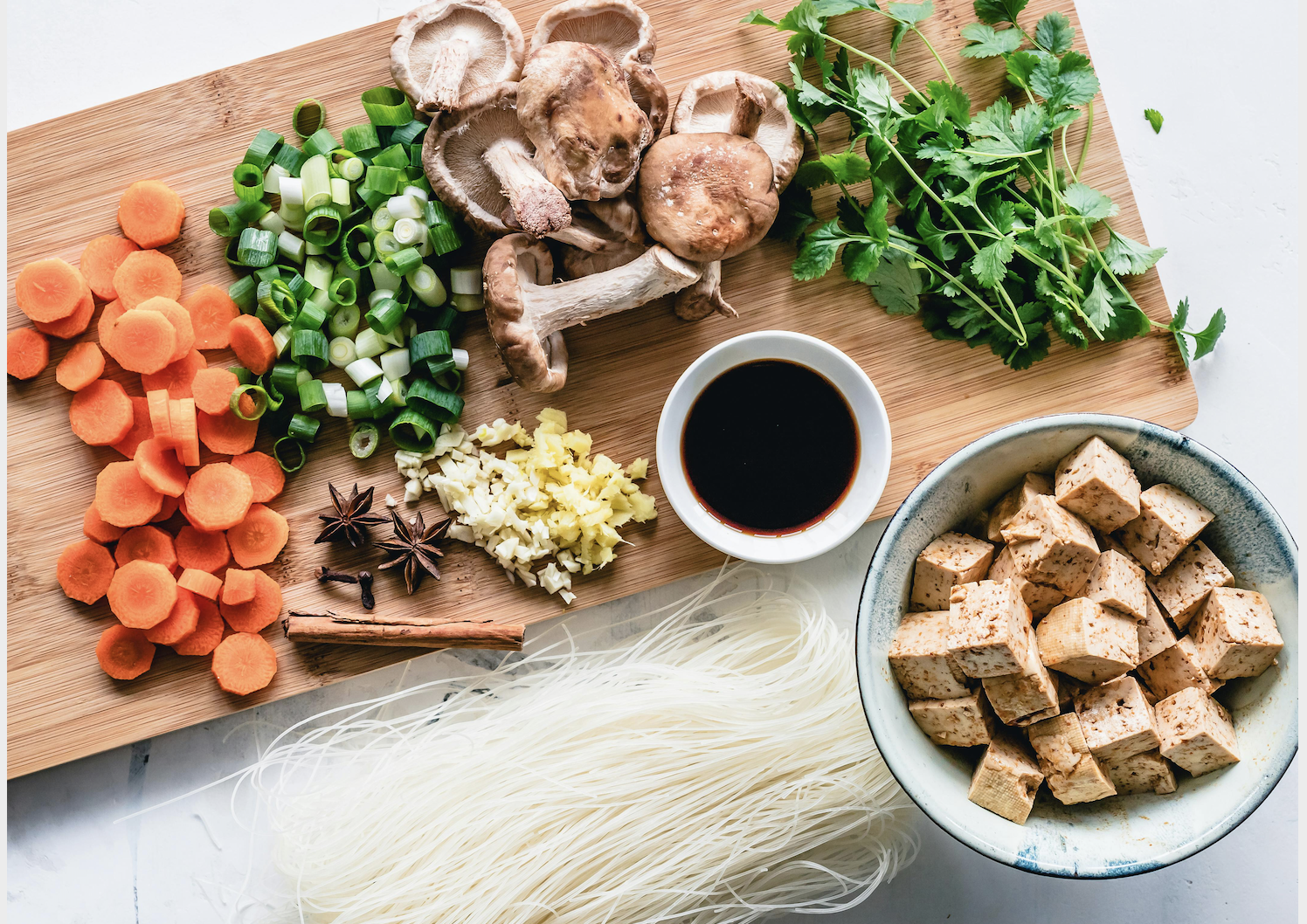
There are so many amazing ways to cook with mushrooms. Check out these recipes from Delish and Bon Appetit.
Before you start your experiments in the kitchen, just be sure to never eat mushrooms you find in the wild (at least until you’ve identified them and verified they are not poisonous.) Also, make sure to prep mushrooms for cooking. You can do this by wiping off visible dirt or debris with a damp paper towel.
Also, it’s important to note that mushrooms are full of water, so the more you cook them, the more they will shrink. But they will always add value to the deliciousness factor of your dishes. Ready to enjoy the health benefits and exquisite tastes of mushrooms? Go ahead, slice them, and cook those tasty mushroom recipes!
Tags


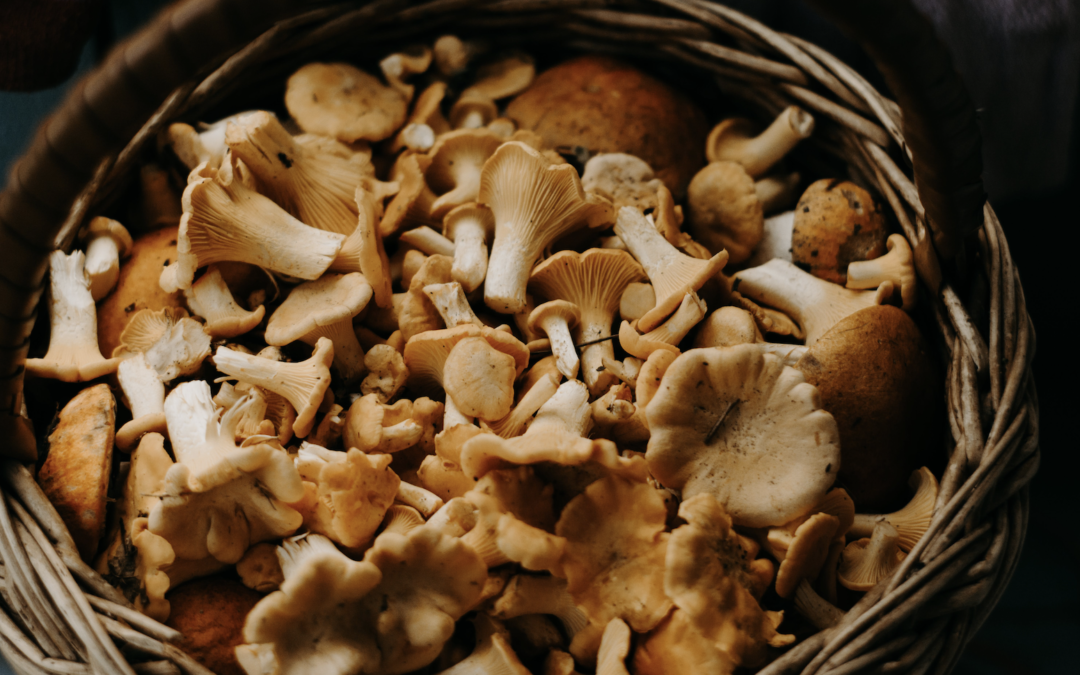
0 Comments
Trackbacks/Pingbacks